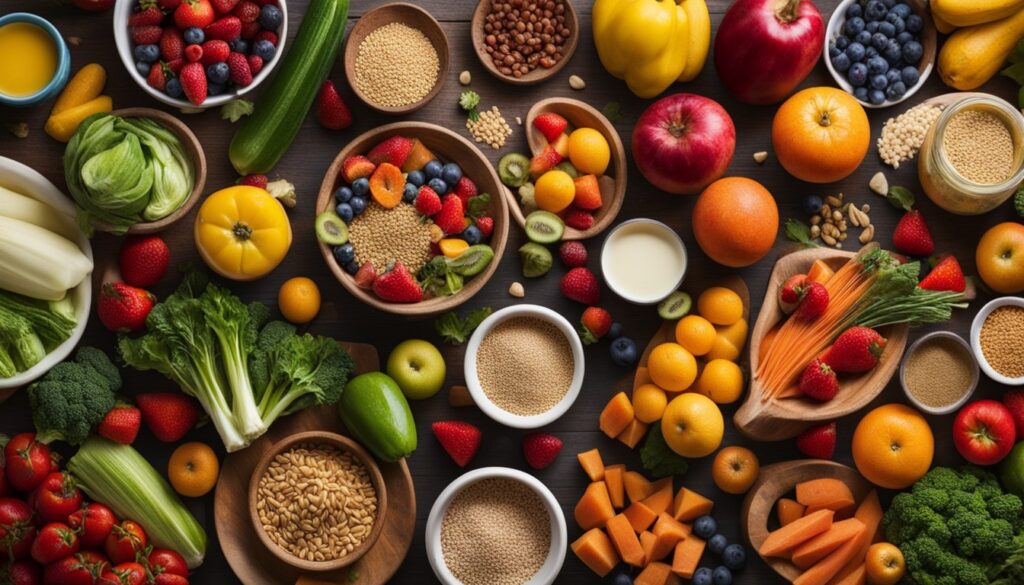About 77% of new moms think they have low milk supply when they don’t because milk production often takes time to ramp up after birth. The good news is that tweaking your diet and lifestyle can boost your milk production naturally. This helps ensure your baby gets all the necessary nourishment.
The more often your baby nurses, the more milk you will make. Avoid strict feeding schedules – feed your baby when they are hungry and for as long as they like. This is crucial in the initial weeks to build up your milk production. Always offer the other breast when one is empty. Many mistake a normal milk supply for a low one. Just make sure your baby is lively and their diaper is often full or wet, and you’re probably doing okay.
Getting enough sleep is vital for milk production. If you feel like your supply is low, a few days of relaxation can work wonders. While stress doesn’t seem to decrease your milk, it might affect how easily it lets down. It’s also important to have supportive friends who lift you up. This will help avoid people who can be discouraging about breastfeeding.

Key Takeaways
- Exclusively breastfeeding moms need 300 to 500 more calories daily to keep up milk supply.1
- Certain foods like garlic, onions, and mint can change breast milk’s taste, encouraging babies to nurse more and, thus, stimulate milk production.1
- Alcohol can limit milk supply, as shown by studies that say it can slow down milk release after one or two glasses of wine.1
- Massaging the breasts while breastfeeding can increase milk volume and its fat content.1
- Some medications like antihistamines and hormonal contraceptives can reduce milk production. It’s best to talk to your doctor about alternative medications if you’re nursing.1
Understanding Milk Supply and Demand
Breastfeeding is all about supply and demand. The more your baby nurses, the more milk you’ll make. This makes new moms often worry about their milk supply.2 But, if your baby has regular wet and dirty diapers, they’re getting enough milk.3 Look for signs like being alert, gaining weight, and at least 6 wet diapers a day.
If you’re still concerned, talk to a lactation consultant or your doctor. They can help you figure out if everything’s okay.
How Breastfeeding Works on a Supply-and-Demand Principle
Our bodies are amazing. They know just how much milk a baby needs. So, the more the baby nurses, the more milk our bodies make.2When we introduce formula, we might breastfeed less. This can lower our milk production.
Now about breastmilk. The body naturally makes it after the baby’s birth.4 It meets the baby’s needs as they keep nursing. In simple terms, the more they nurse, the more milk we make.
Signs That Your Baby Is Getting Enough Milk
How do you know if your baby’s feeding well? Look for a relaxed baby during feeds. They might even detach themselves when full.2 They should be content and have soft breasts.
Also, check their diapers. The wet ones should increase, and their weight should go up too. Their poop should change from black to a soft yellow.
A baby should gain about 4 to 7 ounces each week. This shows they’re getting enough milk.3 Not gaining weight means they might need more milk.
It’s normal for moms to worry if their milk is enough. But, don’t rely on how your breasts feel or leaking milk.3If you’re worried, talk to a lactation consultant or your doctor. They can give you the best advice.
Nutritional Needs While Breastfeeding
When you breastfeed, you need more food. About 330 to 400 extra calories a day are crucial to make milk. These should be from healthy foods: whole grains, lean proteins, fruits, veggies, and dairy.56 Eating balanced meals ensures you get all the needed vitamins, minerals, and nutrients. It’s a good idea to keep taking a multivitamin while breastfeeding, as your doctor may suggest.
Extra Calorie Requirements
Producing milk asks for more energy. Around 330 to 400 extra calories daily are needed. This amount increases after the first 6 months for those with a healthy weight before pregnancy.56
Balanced Diet with All Food Groups
A balanced diet is key for new moms. It ensures they get all the vitamins and minerals necessary. Make fruits and veggies half your plate, and choose whole grains. Your doctor might also advise a daily multivitamin.
Plus, drink lots of water. This is important. Losing weight slowly is safer while breastfeeding.7

Eating healthy supports milk production. It also gives your baby the best start. With the right diet and advice, moms can be sure they are doing the best for their baby.
Importance of Staying Hydrated
It’s very important to drink enough water when you’re pregnant or breastfeeding.8 Experts say you should have 64 to 96 ounces, or 8 to 12 cups, daily while pregnant.8 Pregnant and breastfeeding women can lose a lot of water through breast milk each day.8 For that reason, breastfeeding moms should aim for 128 ounces, or 16 cups, a day.8 Remember to drink a glass of water with each feeding. Pay attention to your body’s signals. If your urine is dark yellow, drink more water.
Sugary drinks and too much caffeine can harm milk production and affect your baby’s sleep.8 While breastfeeding, it’s safe to have up to 300 milligrams of caffeine a day.8 Eating enough fruits and veggies can provide a good amount of your daily fluid needs.8 Severe morning sickness (hyperemesis gravidarum) can lead to dehydration during pregnancy.8 Signs of dehydration include dark urine and not passing urine often, a dry mouth, the stop of sweating, and feeling dizzy. Severe dehydration can harm your baby’s health.
Most of breast milk is water, so you need to drink a lot.9 Experts say you should aim for 128 ounces, or 16 cups, a day.9 Try to drink a glass of water before and after feeding your baby, and with your meals.9 It’s not proven that drinking more water increases milk supply.9 But, if you’re dehydrated, you might feel constipated, dizzy, tired, or have muscle cramps.9 Feeling thirsty means you need more water. When you breastfeed, your body makes a hormone that makes you thirsty.
Your urine should be pale yellow. That means you’re drinking enough water.9 Eating foods with lots of water, like fruits and veggies, also helps keep you hydrated.9 Drinking too much water can lower your milk supply.9 Sodas with lots of sugar can make you lose water.9 Caffeine can dry you out, and alcohol isn’t good for your milk supply. It’s best to stick to water. How much you need to drink can depend on the weather and how active you are.
Myth of Galactagogues and Special Foods
The idea that some foods can boost milk supply is common knowledge, but the truth is more complex. While some foods are thought to help, there’s not enough proof they really do. This is true for all but a few drugs that are shown to increase milk supply.
So, rather than looking for magic foods, it’s better to eat a healthy, balanced diet. This supports not just milk production but overall health too.10
Understanding Galactagogues and Their Limitations
Galactagogues are foods and supplements meant to up milk supply. But their actual impact is uncertain. The ACOG warns against depending solely on these products. They say it may not work well and could also be risky.
Even though some mothers claim these products work, it’s wise to be skeptical. Focusing on proven ways to enhance milk production is safer and more effective.10
No Scientific Evidence for Specific Milk-Boosting Foods
No foods or herbs have been definitely shown to boost milk. Although many believe things like fenugreek and ginger help, there’s no solid proof. Breastfeeding regularly and eating a well-rounded diet are the real keys to a steady milk supply.10

diet for breastfeeding mothers to increase milk
There’s no magic food for more milk, but eating well helps your body produce it.1 A breastfeeding mom should eat 300 to 500 more calories than before getting pregnant to keep her milk flowing.1
Focusing on Overall Healthy Eating
Eat a mix of healthy foods like fruits, veggies, whole grains, clean proteins, and dairy.1,11 These foods are packed with what you need. They give you the energy and nutrients to make lots of milk for your little one.
Including Nutrient-Rich Foods in Your Diet
If you’re nursing and have shed your baby weight, add 500 to 600 calories daily.11 Eating fish a few times a week ups the DHA in your milk, which helps your baby’s brain grow.11 Even if you’re a vegetarian, you can still breastfeed well. Just plan your meals to get enough iron and zinc.11

Role of Caffeine and Alcohol
Keeping a healthy milk supply and your baby’s safety in mind, it’s vital to watch your coffee and beer intake. You should only have 2-3 cups of caffeinated drinks each day. More caffeine might make your baby fussy or keep them up at night.12 A typical cup of coffee has around 150 mg of caffeine,12 so think about how much you drink.
When it comes to alcohol, too much can slow down your milk making and stay in your breast milk for a while. A single glass of wine or beer occasionally is alright. But remember, keep it to just one per day.12 Having more than one means you should wait 8 hours before breastfeeding again, or until you feel sober.12
Some jobs for new moms, work-from-home opportunities for mothers, and flexible jobs for moms might deal with this issue. They require a careful combination of managing caffeine, alcohol, and caring for your baby. Part-time jobs for new parents, remote jobs for mothers, and re-entry jobs after maternity leave offer the needed flexibility. This flexibility lets you put your family first. Family-friendly jobs and mom-focused careers agree with the special needs of employment for stay-at-home moms. Such careers are very helpful during this special time.
Vegetarian and Vegan Diets for Breastfeeding
When you’re breastfeeding on a vegetarian or vegan diet, it’s important to focus on key nutrients. You need enough protein, iron, and calcium.13 Luckily, there are many good sources. For example, legumes, tofu, and leafy greens are excellent. Dairy is good for vegetarians, too.14
Ensuring Adequate Protein, Iron, and Calcium Intake
Women need about 0.59 g of protein for every pound they weigh.14 Vegetarian and vegan moms who are breastfeeding can get this protein from beans, lentils, and soy products.14 For iron, the goal is 9 mg a day for moms aged 19-50. Foods like leafy greens, fortified cereals, and legumes are great iron sources for these moms.13 These moms also need more calcium, about 1200 to 1500 mg per day.
Considering Supplements for Vegetarians and Vegans
Healthcare providers may suggest supplements, like vitamin B12, for essential nutrients.13 Vegetarian or vegan moms need 2.8 mcg of vitamin B12 daily. Infants aged 6 months or younger should have 0.4 mcg.13 A 400 IU vitamin D supplement for infants is also advised.
This is because vegan breast milk can have less vitamin D. This amount is about 1.10 mcg/L in vegans and 3.43 mcg/L in those who eat meat.13 For pregnant and lactating women, a DHA supplement of at least 200 mg a day is recommended. This helps balance the lower levels of DHA in vegan breast milk, which was reported at 0.15% compared to 0.33% for those who eat meat.13
Managing Food Sensitivities and Allergies
If your baby gets upset, has a rash, or trouble breathing after feeding, they might be allergic to foods in your diet.15 Studies show that 2 to 7% of babies under one might not handle cow’s milk proteins well. And, about 60% of those might also react to soy proteins.15 This issue, known as Milk Soy Protein Intolerance (MSPI), affects babies whether they drink breastmilk or formula.15 Cow’s milk and soy are top triggers for food sensitivity in babies.
Symptoms of food issues in babies can include being fussy, having stuffy noses, or rashes.15They might also lose weight or spit up more. If your baby is fussy, try cutting out certain foods for a week. Foods like garlic, onions, broccoli, cabbage, and beans are often to blame.
Diagnosing MSPI depends on the baby’s symptoms and a test with no milk and soy foods.15 Babies with MSPI often get better 3 to 7 days after their mothers stop eating the problem foods.15 There’s no medicine for MSPI. The best treatment is for the mother to avoid these foods.
If a baby gets formula, switching to a special dairy and soy-free one might help, and it works for most with cow milk protein issues.15 Labels must list if a product has major allergens like peanuts or milk. This helps people with food allergies know what’s safe to eat.
Always ask your doctor about your baby’s food concerns. They can help with tips on finding and handling food issues.
Seeking Professional Support
If you’re having problems with breastfeeding or are worried about milk supply, get professional help. A lactation consultant offers expert advice on many issues. They help with proper latching, nursing positions, and how to increase milk production16. They can ease worries about low milk and find solutions. Your doctor can also offer support for breastfeeding difficulties.
Consulting with Lactation Consultants
Lactation consultants are experts in helping breastfeeding mothers. They check your breastfeeding techniques, advise on how to attach your baby, and help with common issues like low milk and sore nipples. It’s important to ask for help. A lactation consultant can make a big difference in your early motherhood days.
Addressing Concerns about Low Milk Supply
If you’re concerned about not making enough milk, a consultant can look into why. They will observe how your baby feeds and his/her weight gain. They give tips to boost milk production, like feeding more often, power pumping, or using certain products17. Most mothers do produce enough milk16. But having a professional guide you ensures you and your baby get the nutrition you need.
Conclusion
Being a breastfeeding mom, it’s key to eat a balanced, nutritious diet and drink enough water.18 Some foods and supplements claim to boost milk, but their benefits are unclear.19 It’s better to rely on your body’s natural process to meet your baby’s milk needs.
Ensure you eat plenty of fruits, vegetables, whole grains, lean proteins, and dairy products. This provides calories and nutrients for strong milk.18 Also, drink lots of water to keep a good milk flow.19 With healthy eating and guidance from experts, you’ll nourish your baby well.
As a mom who breastfeeds, I’ve discovered the key to healthy milk supply is not in trendy supplements or super foods. It’s about having a balanced, nutrient-dense diet and drinking lots of water. The big hyped galactagogues might look appealing, but the ACOG warns against them just yet.20
I focus on eating a wide range of healthy foods every day. This includes fruits, veggies, lean proteins, and whole grains. This approach provides my body with all the right vitamins, minerals, and nutrients for making milk naturally.20 I make sure to drink enough water too. It’s really helped me keep my milk supply strong.
Breastfeeding comes with its own tough moments, but I try not to be too tough on myself.20 Even our best efforts may face setbacks, like our milk supply dropping or our babies struggling to latch or gain weight. In such times, getting help from lactation experts and my health team has been crucial. They offer great advice and solutions to any breastfeeding issues I might face.20
FAQ
How does breastfeeding work on a supply-and-demand principle?
What are the signs that my baby is getting enough milk?
How many extra calories do I need while breastfeeding?
How important is staying hydrated while breastfeeding?
Are there any special foods or supplements that can increase my milk supply?
What should I focus on to ensure I’m eating a healthy diet while breastfeeding?
How much caffeine and alcohol can I have while breastfeeding?
What do I need to consider if I’m following a vegetarian or vegan diet while breastfeeding?
What should I do if I suspect my baby is reacting to something in my diet?
Where can I get professional support for breastfeeding and milk supply concerns?
Source Links
- https://www.webmd.com/parenting/baby/ss/slideshow-increase-milk-supply
- https://www.nhs.uk/start-for-life/baby/feeding-your-baby/breastfeeding/breastfeeding-challenges/milk-supply/
- https://www.whattoexpect.com/poor-milk-supply-breastfeeding.aspx
- https://www.pregnancybirthbaby.org.au/increasing-your-breast-milk-supply
- https://www.mayoclinic.org/healthy-lifestyle/infant-and-toddler-health/in-depth/breastfeeding-nutrition/art-20046912
- https://health.gov/news/202108/nutrition-during-breastfeeding-how-health-professionals-can-support-healthy-moms-and-babies
- https://wicbreastfeeding.fns.usda.gov/nutrition-while-breastfeeding
- https://www.webmd.com/baby/what-to-know-staying-hydrated-while-pregnant-breastfeeding
- https://www.verywellfamily.com/does-drinking-more-water-affect-breastfeeding-284285
- https://www.healthline.com/health/galactagogues
- https://www.chop.edu/pages/diet-breastfeeding-mothers
- https://pediatricassociatesnc.com/Breastfeeding-Mother-s-Diet-and-Alcohol-Use
- https://infantrisk.com/content/vegan-diets-during-breastfeeding
- https://e-lactancia.org/media/papers/Vegetarian_diets_during_Lactation-AcNutDiet2010.pdf
- https://dhhs.ne.gov/Pages/Breast-Milk-Sensitivity.aspx
- https://health.clevelandclinic.org/foods-to-increase-milk-supply
- https://milkify.me/blogs/blog/best-foods-for-breastfeeding-boost-your-milk-supply-with-these-nutritious-options
- https://www.ncbi.nlm.nih.gov/pmc/articles/PMC8160768/
- https://www.ncbi.nlm.nih.gov/pmc/articles/PMC10818638/
- https://www.ncbi.nlm.nih.gov/pmc/articles/PMC10514476/

Aine Austria is a content creator, freelancer, entrepreneur, essential oils educator, nacho lover, and mom to an adorable daughter. She helps aspiring mom bloggers and entrepreneurs launch their blog, alongside other money-making opportunities. Aine believes that everyone has a story to tell and that their experiences and talents can be shared with the world.
Aine’s passion for writing and sharing her knowledge with others started at a young age. Growing up, she always loved to read books, write stories, and express herself through words. She strongly believes that moms can still pursue their dreams and passions while raising a family, and she aims to inspire other moms to do the same through her work.
Leave a Reply